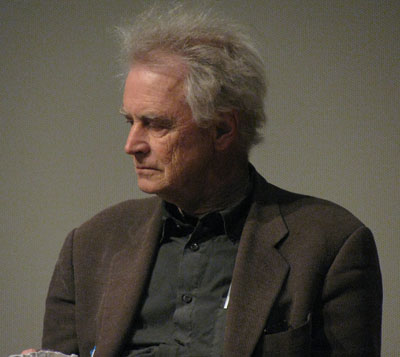One of the big surprises of last year was Cinema Guild‘s acquisition and release of Thom Andersen’s landmark documentary Los Angeles Plays Itself. For about a decade, the clearing the rights for this carefully constructed feature-length sequence of clips posed a seemingly insurmountable challenge. But now it’s out there, along with three other works by Andersen, Eadweard Muybridge, Zoopraxographer (1975), Reconversão (2012) and Red Hollywood (1996), which has recently been remastered and re-edited and is the subject of Colin Beckett‘s conversation with Andersen for Guernica.
The film, made in collaboration with Noël Burch, is based on Andersen’s 1985 essay, “Red Hollywood,” which “was the first in a series of what he would later describe as ‘fugitive and ephemeral’ contributions to blacklist scholarship,” as Beckett explains in his introduction. “Primarily historiographical, the essay is a caustic dissection of the ways commentators have employed the blacklist and its victims. Andersen savages three generations of liberal historians and cultural critics for their refusal to face the true political and aesthetic stakes of the HUAC hearings, and provides a sensitive sketch of the social forces and political goals that animated Communist screenwriters, directors, and actors.”
The conversation begins with Andersen’s political education and his work with Burch and Allan Sekula in the Reagan era before expanding on the themes of Red Hollywood. As noted last week, Andersen’s next project is The Thoughts That Once We Had, a “look at the history of cinema, loosely inspired by the writings of French philosopher Gilles Deleuze.”
Lee Ann Norman introduces her interview with Melvin Van Peebles: “While he is perhaps best known for the groundbreaking film Sweet Sweetback’s Baadasssss Song (1971), it’s only a small part of his oeuvre. He’s published books and stories, released a record prefiguring spoken word and rap, reimagined Sweetback as an opera, and is currently working on two theatrical productions.” He also paints. And he’s got quite a story to tell about one evening he invited a “lady friend” over to paint her portrait.
Also in Bomb: Steve MacFarlane talks with Desiree Akhavan (Appropriate Behavior) and Pamela Cohn interviews Deborah Stratman: “The editing of her film and video work is distinctive, and—perhaps, oddly—reminds me quite a bit of the work of Armenian director, Artavazd Pelešjan, also a brilliant essayist and theorist, who creates highly poetic views of life on celluloid.”
Mamoru Oshii at the TIFF Lightbox
“Éric Rohmer’s editorship of Cahiers ended in June 1963 after Jacques Rivette, and others, organized his decommission, so that they could better promote an emerging modernist cinema and their Nouvelle Vague peers.” So begins a very informative post that David Davidson‘s put up recently. Davidson sketches a brief history of the clashes at the magazine in the years that followed and then presents generous excerpts from interviews with Rohmer that appeared in the November 1965 and April 1970 issues of Cahiers du Cinéma—interviews that have never before appeared in English.
Martin Dale introduces an interview for Variety: “With a 40-year career, spanning 30 films, Patrice Leconte is one of France’s most versatile and accomplished directors, with credits including cult pics Monsieur Hire, Ridicule and The Hairdresser’s Husband. He delights in shifting genres and filming styles from one project to the next.” Leconte is currently writing a film with the specific goal of “bringing Vanessa Paradis and Natalie Portman together in a film.” Dale: “Ok. But we can’t say that publicly, right?” Leconte: “Of course you can. But they don’t know. They haven’t read anything of the script. I’m still writing, thinking about the two of them.”
Last week, Slant‘s Ed Gonzalez posted an especially strong round of “Links for the Day,” one of them taking us to Jennifer Lawrence‘s conversation with Eddie Redmayne for Interview.
Viewing (11’24”). For the Notebook, Ricky D’Ambrose talks with Bruno Dumont about “the (anti) naturalism of his films, his preference for cinemascope and direct sound, and the tragicomic Li’l Quinquin.”
For news and tips throughout the day every day, follow @KeyframeDaily. Get Keyframe Daily in your inbox by signing in at fandor.com/daily.




